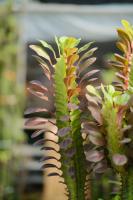Introduction
Peanuts are a well-known and loved food item around the world. They can be eaten as a snack, used as an ingredient in various dishes, and even made into peanut butter. But have you ever wondered where peanuts come from? Specifically, do peanuts grow on trees or plants? In this article, we will delve into the world of peanut farming to answer this question.
The Peanut Plant
Contrary to popular belief, peanuts do not grow on trees. Instead, peanuts are a type of legume that grows on plants. The peanut plant, also known as Arachis hypogaea, is an annual herbaceous plant that belongs to the Fabaceae family.
The peanut plant has a very distinctive growth habit. After planting, it grows quickly and begins to produce flowers in about 40 to 45 days. These flowers are self-pollinating and are normally yellow in color. After pollination, the flowers wilt and the ovary of the flower elongates to form a peg. The peg then penetrates the soil and forms a peanut pod underground.
The Peanut Pod
The peanut pod is a fascinating structure that develops underground. It is roughly egg-shaped and has a thin, papery outer layer. The pod contains anywhere between one and four seeds, which are the actual peanuts that we eat.
When the peanut pod is fully mature, it will be difficult to remove from the plant. This is because the peanut plant has a unique harvesting method. Rather than pulling or cutting the plant, farmers wait for the pods to mature and then pull up the entire plant from the ground. The plant is then left to dry in the sun for a few days before the pods are removed and the peanuts are extracted.
The Peanut Farming Process
Peanut farming is a complex process that requires careful planning and maintenance. The first step in peanut farming is preparing the soil. Farmers must ensure that the soil is free of weeds, has adequate drainage, and is rich in nutrients. Next, the peanut seeds are planted in rows using machines, and the seedlings are thinned to ensure that only the strongest plants remain.
Throughout the growing season, the peanut plants require regular irrigation and fertilization to promote healthy growth. Farmers must also monitor the plants for pests and diseases and take proactive steps to prevent damage from these sources. Finally, once the peanuts are mature, the plants are harvested and the peanuts are extracted as described above.
Conclusion
So, do peanuts grow on trees or plants? The answer is clear: peanuts grow on plants. Specifically, they grow on the peanut plant, a remarkable annual herbaceous plant that produces one of the world's favorite foods. From the peanut pod to the farming process, there is much to learn about the journey of the humble peanut. So the next time you enjoy a handful of peanuts, take a moment to appreciate the hard work and dedication that goes into growing this delicious snack.

 how many times do yo...
how many times do yo... how many planted tre...
how many planted tre... how many pine trees ...
how many pine trees ... how many pecan trees...
how many pecan trees... how many plants comp...
how many plants comp... how many plants can ...
how many plants can ... how many plants and ...
how many plants and ... how many pepper plan...
how many pepper plan...






























